Debbie Young's Blog, page 39
October 20, 2016
Coming Soon: Two Talks in Three Days (22 & 24 October)
Hello folks, just a quickie to give you advance notice of two events that I’m involved in over the next few days.
1. Indie Author Fringe Conference Talk: “The Best Day Jobs for Authors” (Saturday 22nd October)
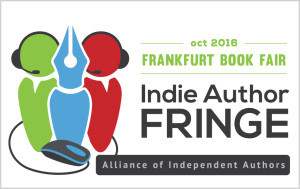 On Saturday 22nd October at 6pm, my talk in the autumn Indie Author Fringe Conference will be broadcast online by the Alliance of Independent Authors (ALLi), which hosts this fab series of free online conferences that you can join in wherever you are in the world.
On Saturday 22nd October at 6pm, my talk in the autumn Indie Author Fringe Conference will be broadcast online by the Alliance of Independent Authors (ALLi), which hosts this fab series of free online conferences that you can join in wherever you are in the world.
ALLi runs three conferences each year, to coincide with the world’s biggest book trade events – the London Book Fair, Book Expo America and the Frankfurt Book Fair.
The Frankfurt Book Fair is currently in full swing, and the IAF Conference will run for 24 hours from Saturday through to Sunday, starting at 10am Frankfurt time. My talk will be at 6pm on Saturday 22nd October on the topic of “The Best Day Jobs for Authors”. and I’m including advice from lots of fellow ALLi authors as well as drawing on my own experience. Click here to find out about the full programme and how to join the Fringe live online as it happens, visit this page.
All the talks will also be available online for evermore afterwards too, so don’t worry, you don’t have to forego sleep for 24 hours to join the fun. If you’d like to enjoy my contributions to the two previous 2016 IAFs, here they are:
The Better Way to Write a Book – Plotter of Pantser? – in which I chair a lively debate with fellow indie authors Keith Dixon, David Penny and Rosalind Minett
Book Marketing Begins at Home – a blog post rather than a talk
2. BBC Radio Gloucestershire: Reading “The Alchemy of Chocolate” live on air
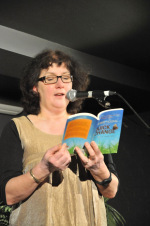 Reading “The Alchemy of Chocolate” at Stroud Short Stories, April 2015
Reading “The Alchemy of Chocolate” at Stroud Short Stories, April 2015I’m delighted to have been invited to give my first ever live reading on BBC radio of one of my short stories, The Alchemy of Chocolate. I’ve been invited to read this particular one as part of a piece promoting Stroud Short Stories,because it was the same story that I read at the April 2015 SSS event and also at SSS’s Cheltenham Festival of Literature event last Monday. (I’ll be posting separately about that once I have photos . Event organiser John Holland will be in the studio with me on Monday 24th October on the lunchtime show at 12noon, and he’ll be reading some of his stories too, which are always compelling and often very funny.) Tune in here.
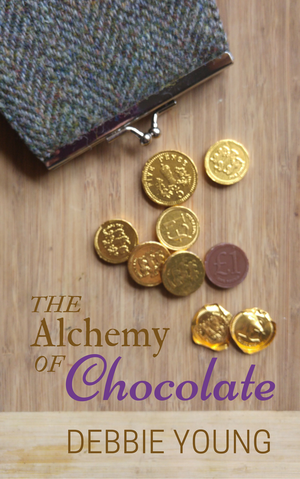
“The Alchemy of Chocolate” is one of the stories in my flash fiction collection Quick Change, and it’s also available as a free download for anyone joining my Readers’ Club, which means I’ll send you news of new books, events and special offers, plus a free short story with every enewsletter. Just click here to sign up.
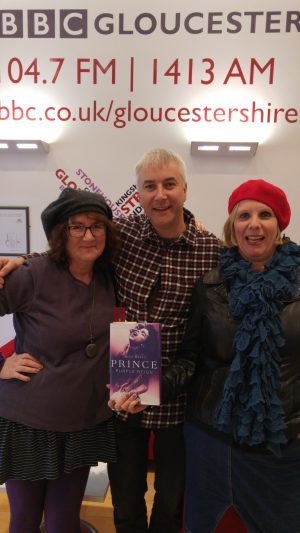 Having fun at the October Book Club at BBC Radio Gloucetershire yesterday
Having fun at the October Book Club at BBC Radio Gloucetershire yesterdayIn the meantime, if you’d like to catch the October BBC Radio Gloucestershire Book Club broadcast, featuring Caroline Sanderson, Associate Editor of The Bookseller, and me, talking books with presenter Dominic Cotter, you can do so here – it starts an hour into the show. No prizes for guessing what this month’s read was – as you can see from the photo, we got into the spirit of it, raiding our wardrobes for purple. Caroline even managed to rustle up a raspberry beret! We like to think Prince would have approved.
Filed under: Events, Reading, Self-publishing, Writing Tagged: Alliance of Independent Authors, Indie Author Fringe, John Holland, Stroud Short Stories

October 19, 2016
Beware of Scary Crows
My column from the October edition of the Hawkesbury Parish News was written in the run-up to our annual village Scarecrow Trail
 Charmingly detailed scarecrows outside Beaufort House, our local residential home for elderly people, during the 2016 Hawkesbury Upton Scarecrow Trail
Charmingly detailed scarecrows outside Beaufort House, our local residential home for elderly people, during the 2016 Hawkesbury Upton Scarecrow TrailWhile taking the scenic route to Cheltenham earlier this week, I nearly crashed the car when I spotted Harry Potter on his broomstick. A closer look revealed he was in fact a scarecrow in someone’s front garden, sadly too distant for inclusion in Hawkesbury’s Scarecrow Trail.
I don’t know why scarecrows attract people as much as they deter birds, but there is something very winning about a well-made scarecrow, and not only on Hawkesbury Show Day. I reckon Scarecrow Trails are what inspired the Gromit and Shaun the Sheep events that recently took Bristol by storm, every exhibit a riff on the same theme, allowing its maker to express his or her own sense of fun.
 Selfie with my favourite Gromit, designed by Cath Kidston
Selfie with my favourite Gromit, designed by Cath Kidston Our Very Hungry Caterpillar scarecrow was cunningly recycled from a Village Show carnival costume by replacing four children inside it with two planks of wood and two bricks
Our Very Hungry Caterpillar scarecrow was cunningly recycled from a Village Show carnival costume by replacing four children inside it with two planks of wood and two bricksYou’d think birds would have to be daft to be repelled by such inanimate objects, but don’t be taken in by them. Crows are smarter than you might think. If you google “crows using tools”, you’ll be scared by their prowess. Like early man, they’ve learned to manipulate sticks and to bend or break them to form more useful tools. I’ve even seen a video of one bird giving another CPR until they both flew away unscathed.
Birds may not have the opposable thumbs that helped human beings get to where we are today, but with the bonus of long beaks, they are slowly catching up with us. Let’s hope they only ever use their powers for good. But just to be on the safe side, I’m leaving my scarecrow in place after Trail week is over.
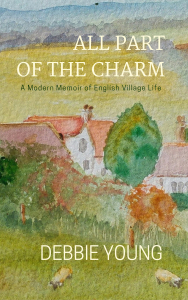 My memoir of village life is available as an ebook and in paperback
My memoir of village life is available as an ebook and in paperbackTO READ MORE POSTS LIKE THIS
If you enjoyed this post, you might like All Part of the Charm: A Modern Memoir of Village Life , the book I published earlier this year combining all my columns for the Hawkesbury Parish News from 2010 to 2015.
It also includes as bonus material a collection of essays I wrote about moving to the village 25 years ago. Now available in paperback or as an ebook, it’s perfect bedtime reading – or for your smallest room!
Filed under: Events, Personal life, Writing Tagged: birds, crows, Gromit, Hawkesbury Parish News, scarecrows, Shaun the Sheep

October 12, 2016
The History of My Husband in 100 Socks
My column for the October issue of the Tetbury Advertiser goes from the sublime to the ridiculous
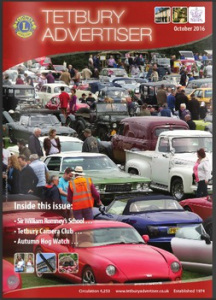 … and also inside this issue is my regular monthly column
… and also inside this issue is my regular monthly columnDuring a rare and much-needed tidying blitz on our house, I fall to musing on the current fashion for summing up a topic by listing 100 of something in a particular category. Neil MacGregor, Director of the British Museum, kicked it all off with his fascinating BBC Radio 4 series, The History of the World in 100 Objects. His list of iconic items, from a Stone Age spear point to the solar powered lamp, captured the public’s imagination.
Its success sparked many equally fascinating copycat series. I’ve just downloaded podcasts of The Story of Music in 50 Pieces (lazy), and the Bath Fashion Museum shares The History of Fashion in 100 Objects on its website here.
Sock It To Me
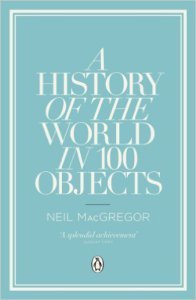 The inevitable book of the radio series
The inevitable book of the radio seriesTurning out my husband’s wardrobe, it occurs to me that I could write his life story in the history of his socks, all of which seem to need pairing. Piled on the floor before me are at least 100, some so ancient that carbon dating would not go amiss to ensure the accuracy of my proposed catalogue.
To get an easy tick – and to stop me losing the will to live before the task is complete – I marry up the obvious matches first, such as the scarlet pair to be worn with his kilt. (He’s not eccentric he’s just Scottish.) I then sit quaking as the enormity of the remaining task dawns on me.
Sock Swap
Meanwhile next door in our daughter’s bedroom, where she is tasked with tidying up, all is quiet. On enquiry, I learn that she is “taking a rest” about five minutes after starting, as discouraged as I am. “I’d much rather do what you’re doing,” she hints, and I’m quick to agree to swap.
By the time my husband’s socks are paired and restored to his sock drawer, my daughter’s bedroom is immaculate. She’s also richer by nearly £14 from the notes and coins I found languishing forgotten beneath the dust and toys. She welcomes less enthusiastically the chocolate butterfly that was best before July 2014.
Each of us is happy that our goals have been met, without having to do the donkey work we dreaded ourselves.
Sock Tension
But where is my husband all this time, I hear you ask, and why was he not pairing his own socks? Surely neither my daughter nor I should be doing his wardrobe maintenance chores in this liberated age for?
Hold fire before you condemn him: he is spending all day out of door, tiling the roof of our new extension. As someone with the head for heights of Humpty Dumpty (though thankfully not quite the waistline), I’m happy to suppress my natural feminist leanings when it suits me. After all, one man socks are another man’s poison.
PS I’m kicking myself that I didn’t think to take photos of the work-in-progress in either bedroom, but you may well thank me for that! Here instead is an image of Action Man in progress, in matching socks, on the extension roof outside my study window.
 What looks like a giant banana is apparently a special tool for working lead. Of course. He has a set of six, all in subtly different shapes. Thankfully, not nearly so numerous as his socks. Yet.
What looks like a giant banana is apparently a special tool for working lead. Of course. He has a set of six, all in subtly different shapes. Thankfully, not nearly so numerous as his socks. Yet.TO READ MORE LIKE THIS:
If you’d like to read the archive of my Tetbury Advertiser columns from 2010-2015, they’re now available in paperback or as an ebook from all good retailers. (If it’s not in stock, a good bookshop will be able to order it in if you provide the ISBN: 978-1911223030.
To read other posts about tidying up (which I seem to spend half my life doing, despite being VERY TIDY myself), try these…
… plus this one about how to keep the inside of your computer tidy:
… and finally, one about tidying especially for my fellow writers:
Creative Memory and Creative Amnesia and Why They Matter
Filed under: Family, Personal life, Writing

October 10, 2016
My Debut at Cheltenham Literature Festival
A newsflash about my appearance tonight at the biggest and longest-standing lit fest in the UK
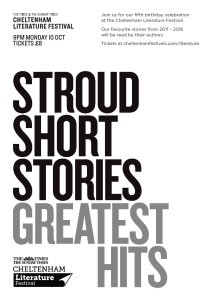 Featuring… me!
Featuring… me!Over the weekend, a message flashed up on the corner of my computer screen: “YOU’RE IN!” Clicking to read the full email, I learned to my delight that I’ve been selected to read one of my short stories at Cheltenham Literature Festival tonight, in the 9pm event in the Little Big Top, entitled “Stroud Short Stories’ Greatest Hits”.
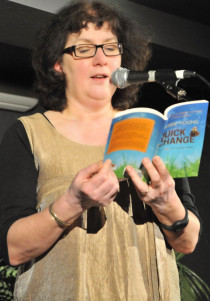 Reading from one of my short story collections at Stroud Short Stories event, April 2015
Reading from one of my short story collections at Stroud Short Stories event, April 2015Stroud Short Stories organiser John Holland had chosen 7 out of 120 stories that had previously been read at its twice-yearly story evenings. Each SSS event provides a snapshot of the high calibre of local writing. These 120 stories had themselves been sifted from thousands of stories submitted to SSS over the years.
While the story I read at the April 2015 Stroud Short Stories event was not one of the first seven chosen, Katherine Hunter, one of the original line-up, had unfortunately fallen ill, and so I was pulled off the reserve bench to fill the gap. I’m really sad for Katherine to have to miss this opportunity due to illness, and I hope she makes a speedy recovery.
In the meantime, I’ll be dusting off my gold dress, an appropriate outfit for reading “The Alchemy of Chocolate”, which I wore when I read it at the April 2015 event in Stroud.
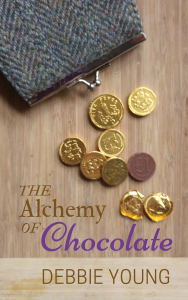 If you join my Readers’ Club, you’ll receive a free download of this short story as a welcome gift
If you join my Readers’ Club, you’ll receive a free download of this short story as a welcome giftI won’t spoil the plot for anyone who is planning to be in the audience tonight, but if you’d like to read the story, you can either buy Quick Change, the collection in which it originally appeared, as an ebook or paperback (ISBN 978-0993087967), or get a copy of the story as a welcome gift when you join my free Readers’ Club.
All that means is you give me your email address and I send you very occasional emails about new books, events and special offers. You can unsubscribe any time you like too, though I hope you won’t want to! Please click here if you’d like to join the Readers’ Club.
Tonight’s Programme
To whet the appetite of the audience, here’s the line-up for tonight’s event, in order of appearance:
Debbie Young – The Alchemy of Chocolate
Philip Douch – Trog and Kron Almost Get It Right
Ali Bacon – Silver Harvest
Andrew Stevenson – A Good Old-Fashioned Cooper
Rick Vick – Seeing
Mel Golding – A Small Change
Bill Jones – The Vampires in the Basement
It will be introduced by the ever-entertaining John Holland, an award-winning short story writer himself.
A good friend of ours, David Penny, a historical novelist and technical manager of the Alliance of Independent Authors, will be attending to video the event, so we hope to be able to share that with you in due course.
In the meantime, you can get a further sneak preview of the event if you tune in to BBC Radio Gloucestershire at 12.30pm today when lunchtime show presenter Dominic Cotter will be doing a quick interview with me. John Holland will also be interviewed on the night by the station’s roving reporter in the Green Room. (I think it’ll be Jo Durrant, who is doing a great round-up of the Festival on a daily basis – catch her on Twitter here.)
Like to Enter the Next Stroud Short Stories Competition?
After all the excitement of tonight is over, it’ll be back to planning the next Stroud Short Stories event, which takes place on Sunday 20th November. You have until the end of Saturday 29th October to submit your entry. Please note admission is free, but only authors who have a connection with Gloucestershire or South Gloucestershire are eligible to enter. Stories may be on any subject, to a maximum of 1500 words. For more details, visit the Stroud Short Stories website. Ooh, nearly forgot to mention – this time I’m the guest judge, alongside John. All entries are anonymised before they reach the judges, so no chances of favouritism. ;)
With thanks to my lovely friend Jacky, who will be in the audience, for flagging up that this week is Chocolate Week – what’s not to love about that?!
Filed under: Events, Reading, Writing Tagged: Cheltenham Literature Festival, John Holland, Quick Change, Stroud Short Stories, The Alchemy of Chocolate

October 5, 2016
My Self-Publishing Advice for Aspiring Indie Authors
A post to help writers become self-publishing authors
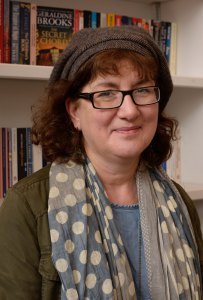 “Help! I want to self-publish the books I’ve written, but I haven’t got a clue how to go about it!”
“Help! I want to self-publish the books I’ve written, but I haven’t got a clue how to go about it!”
That message arrived in my inbox from a very nice chap who I’d enjoyed chatting to at the recent Triskele Literary Festival in London. The advice that I sent him in reply will help any writer thinking of becoming a self-publishing author, so I thought I’d put it on my blog to help as many people as I can.
Tip #1: Join the Alliance of Independent Authors (ALLi)
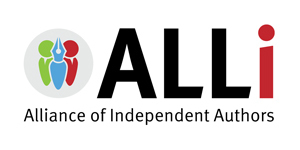 The must-join membership association for self-published authors everywhere
The must-join membership association for self-published authors everywhereFirst of all, you should most definitely join the Alliance of Independent Authors (ALLi) via this link, because you’ll find it an invaluable resource at all stages of your self-publishing journey, in lots of different ways, e.g.
meeting and networking with other self-publishing authors
access to our private Facebook forum where you can ask and find answers to questions about any aspect of writing and self-publishing any time of day or night from our global membership
free guidebooks in ebook form which are definitive guides to different parts of the process
discounts and deals on a wide range of essential services and events
entitlement to post your book news on our Member Showcase
the option to write guest posts on ALLi’s widely read blog, www.selfpublishingadvice.org, of which I’m Commissioning Editor
The benefits are incredibly good value for money, and if any aspiring indie author can afford to pay for only one thing, that’s the one thing I’d recommend.
Tip #2: Learn as Much as You Can Yourself
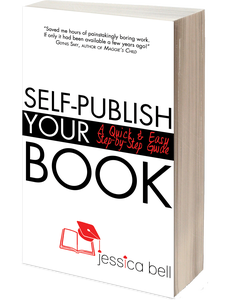 A handy quick read for anyone interested in self-publishing their books
A handy quick read for anyone interested in self-publishing their booksSecondly, it depends on how IT-savvy you are. Self-publishing requires a whole string of computer-based tasks, but they are not rocket science. If you are comfortable with word processing and social media, and you have some spare time to throw at the task, it’s not that hard to master creating book files, especially if you acquaint yourself with various good guide books that I can recommend:
Amazon KDP’s own guide to creating a Kindle ebook (free to download)
Catherine Ryan-Howard’s Self-Printed – appropriately subtitled “The Sane Person’s Guide to Self-Publishing”! (a huge tome but worth every penny)
Jessica Bell’s Self-Publish Your Book (small but perfectly-formed!)
You should soon realise what tasks you can and can’t manage yourself, and you should delegate those to someone else who can. You should ALWAYS get your proofreading done, at the very least, and preferably some editing too if you can afford it, and next on your shopping list should be a good cover design from a book design specialist.
That will be sufficient to get you started by publishing to Amazon in print and ebook form, and once you’ve mastered that you can move on to the various other distribution platforms. If you want to be able to sell your books via bookshops, you should also publish via Ingram Spark. (NB This doesn’t guarantee that your book will be sold in any bookshops, but it makes it possible for bookshops to order them if they want to.
Tip #3: Decide on Your Priorities: Cash vs Time
Thirdly, it depends on whether you are cash-rich, time-poor or cash-poor, time-rich. If money is no object, you can pay a company to publish a book for you, who will do everything other than write it, to get it to the production stage – but you will have to market it. Buyer beware – there are LOTS of charlatans out there, but the good news is that ALLi will help you identify the good guys! Also, of course, if you delegate to a third party, you relinquish some degree of control. Our guide Choosing a Self-publishing Service (free to download if you become a member) is available to buy in paperback here).
Tip #4: Network with Other Indie Authors
It’s also worth joining a good local meetup group of self-publishing authors, if you can find one near you. I run two, in Bristol and Cheltenham, and I’m also involved with one in Oxford, and know of others in London and elsewhere. If you’d like me to put you in touch with any of my self-publishing author friends near where you live, leave a comment and I’ll see if I can hook you up with a group or a like-minded individual.
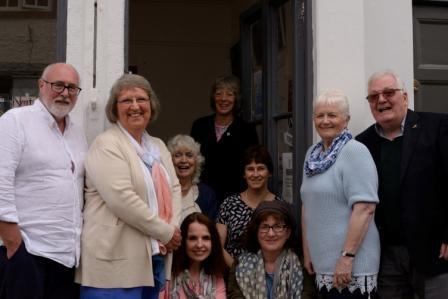 With some of my author friends with the proprietor of the Anthology Bookshop, where we meet once a month in Cheltenham (Photo by Angela Fitch Photography)
With some of my author friends with the proprietor of the Anthology Bookshop, where we meet once a month in Cheltenham (Photo by Angela Fitch Photography)Tip #5: Make Sure Your Book is Really Ready for Publication
Make sure your book is the best it can be before you publish it – it is so easy to self-publish a book these days that it is too tempting to push the “Publish” button sooner than you should!
Tip #6: Keep Writing!
The more books you self-publish, the greater your chances of success. Received wisdom is that provided the books you’ve self-published are any good, and that they are in the same genre, you’ll see a significant increase in sales when you publish your third, fifth and seventh book, and so on – although yesterday someone told me that the fourteenth is the biggest tipping point (no idea why!) So I’d better get back to writing my books, then…
My Self-published Books
I’ve now self-published a number of fiction and non-fiction books, and I’m also currently writing the second in a cosy mystery series of seven, the Sophie Sayers Village Mystery Collection.
To find out about my fiction books, click here
To read about my non-fiction, click here
To so that I can let you know whenever I’m launching a new book, or other book-related news, just click here – and you’ll get a free ebook as a welcome gift!
Filed under: Self-publishing, Writing Tagged: advice for authors, advice for writers, how to self-publish, Self-publishing

September 28, 2016
My Writing Advice for Aspiring Authors
A post to help would-be writers find their voice and their confidence
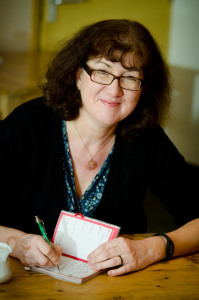 The writer at work! (Photo by Clint Randall of http://www.pixelprphotography.co.uk)
The writer at work! (Photo by Clint Randall of http://www.pixelprphotography.co.uk)Have you ever wanted to write a book, a story or a poem, but not known where to start?
A friend of a friend recently asked me for some guidance, and I was happy to advise her. I’ve posted my answers to her questions below, in the hope that they will help others in the same situation.
If you would like to ask any further questions on the topic, please leave a comment and I will be glad to reply.
1. SOFTWARE
Is there a specific type of software program I should be using?
You don’t need any special type of software to write, and you’re probably best at this stage just to write on whatever software system you’re familiar with, e.g. Word.
If you’re not a touch-typist and have to think about what you’re typing, use a pencil or pen and paper instead. There is a school of thought that says writing by hand helps you be more creative and thoughtful, not least because it makes you write more slowly and think before you write something.
Some writers like speech-to-text dictation systems – Dragon by Nuance is the most popular, and I’ve found the latest edition amazingly accurate – to increase productivity, but at this point, just use whatever you find the least inhibiting and most practical.
Once you have got into your stride, you might like to try Scrivener which is very good for organising long works or collections of short pieces.
2. PLANNING MY STORY IN ADVANCE
Do I come up with an entire story line first, organizing thoughts for chapters in advance? Or do I just start writing, letting ideas and thoughts come as I go, or both? Do I keep a notebook and jot down ideas and incorporate them where they belong within the story? I’m concerned about putting it all together in proper order, so I’m not wasting time later.
Yes, keep a notebook, which will be a kind of verbal sketchbook. Write down anything in there that inspires or interests you. Otherwise you’ll never remember all your ideas. If you want to write something and you’re stuck, just read through your notebook and you’ll have an instant prompt to start writing.
I think it’s helpful to plan a piece of work in a reasonable amount of detail before you start writing, so that you have a structure or roadmap in your head, and it also makes you less likely to go up any blind alleys and get stuck.
But some people prefer literally to make it up as they go along. I chaired a fun discussion on this point at the Alliance of Independent Authors’ Indie Author Fair earlier this year – you can watch the video of it here.
Bear in mind that every writer will revise and edit a piece of work over and over again, and it’s very rare for a story or poem to come out perfect at first shot. Expect to rewrite and fine-tune your work over and over. Many authors think that it’s best to write your first draft as quickly as possible, to maintain flow and get it done, and then spend very much more time editing. Thank goodness for word processors that make it so easy to amend copy these days!
Allow yourself as much time as you need to write, and don’t feel bad about crossing anything out or changing it – all changes will make the end product better.
3. STAYING ORGANISED AS I WRITE
How do I organize content as I’m writing?
It depends what you’re writing. Some people write everything in Word or similar, and print out drafts and put them in a ring-binder, then edit them on paper.
Others use an online filing system e.g. creating a new folder for each book with sub-folders for each chapter etc.
Scrivener is really good for organising as it also gives you areas to put research material, ideas, etc but it takes a while to learn all its tricks. But there are no rights and wrongs – just try to decide what feels most comfortable ad least distracting for you. I always find buying new stationery very motivating
4. INSPIRATION
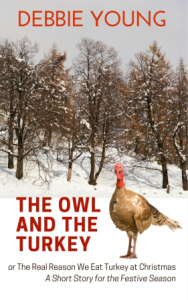 A fun short story inspired by mishearing a snippet of news on BBC Radio 4
A fun short story inspired by mishearing a snippet of news on BBC Radio 4What are the best ways of coming up with ideas for writing content?
You need to develop a writer’s eye and ear.Become a people-watcher. Look out for situations, scenes, overheard snippets of conversation as you go about your daily business. If you find any interesting things, put them in your notebook as raw material.
Some people like creating prompts by doing things like picking up a newspaper or magazine, picking a few stories at random, and investing a back-story behind the headline. Or you might try turning on the radio at random and using whatever you hear as a starting point for a story. (I did this with my Christmas story, The Owl and the Turkey – based actually on mishearing something on the radio. You can read the result here – and there’s also Shay’s kind review of it there!) Other popular writing prompts are to pick a few words at random from a dictionary and find a way of working them all into a story. Personally, I love writing to prompts – it’s great fun!
5. NARRATIVE VOICE
When is it ok to narrate a story and when to have character dialogue?
Again, there are no rights and wrongs about this. Some stories are nearly all dialogue, some have little or none, and plenty are in between. If you are writing in the first person (e.g. there is a narrator who tells the story “I did this” etc) then you will probably have less dialogue than in the third person (when the narrator is not an obvious person).
Experiment and see what sounds right. You will probably realise it without even thinking about whether it is right or wrong – it’ll just feel instinctively correct one way or another. If you’re not sure, try writing a scene both ways, and seeing what feels right, and one is sure to jump out at you as being right.
Equally, when deciding whether to write a story in the first or third person, if you can’t choose, try writing a passage both ways, and one will feel much better than the other. Writing comes a lot from instinct, not from deciding what rules are and trying to follow them. It’s not like making up furniture from a flatpack IKEA kit.
6. WHERE TO BEGIN?
Do I start out just writing a journal for practice of little short stories? Poems?
Writing a journal is a really good idea, as it will help you find your voice and get accustomed to setting out stories. I found blogging was really helpful to me, and lots of aspiring writers write blogs when they’re starting out, sharing their author journey. The journal could be about your daily life, or it could be little stories or snippets of story, practising using words in different ways.
A lot of people assume short stories are easier to write than novels just because they are shorter, but I know plenty of novelists who claim they can’t write short stories because they need a bigger canvas. I’m the opposite – short stories are what comes naturally to me, after years as a journalist and PR writing short pieces, and manipulating the larger pieces are much more challenging for me. However. I’m now getting into my stride as a novelist, and am a quarter of the way into the second of a series of cosy mystery novels that will be published next year, the Sophie Sayers Village Mysteries. Allow your writing to evolve and you will grow as a writer.
Poems are a great way to savour words and phrases and get used to using language in creative ways, but don’t let yourself be constrained by form e.g. they don’t have to rhyme or have the same number of syllables on every line.
Basically, follow your heart and your natural voice (reading a piece aloud, by the way, is a great way to see whether it works and what needs editing), be patient and don’t expect fast results, or try to rush, because being an author is a marathon not a sprint. Allow yourself to experiment and play around, and you will eventually naturally lean towards one form or another.
If you’re the kind of person who likes joining local social groups, you might look out for a writers’ group in your neighbourhood – though on the other hand these can be offputting, as not all of them are very encouraging! I run two of these, one in Bristol and one in Cheltenham – any aspiring authors nearby are welcome to join.
 Great source of author networking opportunities – click the image for more info
Great source of author networking opportunities – click the image for more infoFinally, I’d recommend anyone starting out as an author to join the Alliance of Independent Authors (ALLi) as an Associate Member – you can convert to Author Membership when you publish your first book. You’ll find this global online non-profit group an enormous source of moral support, friendship, networking and practical advice wherever you live in the world. Find out all about ALLi here.
Whatever your writing ambitions, I wish you every success!
If you have any questions not answered above, please leave a comment, and I’ll be happy to reply.
Filed under: Writing Tagged: advice for writers, how to be an author, how to write a book, writing advice

September 20, 2016
The Power of the Summer Holiday
In my column for the September issue of the Tetbury Advertiser , I’m reflecting on the restorative powers of the summer holiday – mine was just drawing to an end when I wrote the copy
 The restorative power of a great view: early morning photo taken from the window of our camper van in Oban, the busiest departure point from mainland Scotland for the Inner and Outer Hebrides
The restorative power of a great view: early morning photo taken from the window of our camper van in Oban, the busiest departure point from mainland Scotland for the Inner and Outer HebridesOn holiday in our camper van this summer, we had the usual struggle to recharge all the family’s electronic gadgets from a single cigarette lighter socket. Not that we’re hooked on our gadgets – in fact, we were trying to have an internet-free break. (Not difficult in Scotland, because the mountains block the signals.) But we still wanted to use our phones to take photographs and to text home, and I wanted to keep my Fitbit topped up.
In case you’ve not come across the Fitbit, I should explain: it’s a fancy electronic pedometer that you wear like a wristwatch. It monitors your steps, heart rate, hours slept, stairs climbed, etc, and it keeps running totals against targets from day to day. With plenty of walking, swimming and cycling on our holiday itinerary, I didn’t want to miss the chance to boost my usually paltry average.
The Beauty of Blips
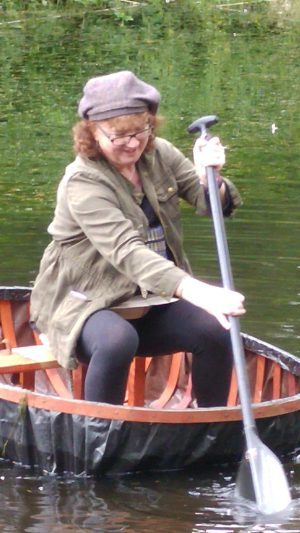 Paddle power: learning to drive that most ancient of boats, the coracle, at the Highland Folk Museum, Newtonmore
Paddle power: learning to drive that most ancient of boats, the coracle, at the Highland Folk Museum, NewtonmoreIt took a lot of electronic juggling to keep all our devices displaying the reassuring five blips of power. Although we have an adapter which allows us to plug in four devices simultaneously, the satnav and the reversing camera take up two slots permanently, so we still had to take turns with the other two.
If we stopped at campsites, the nightly electrical mains hook-up would solve the problem, but we’re too nomadic (and disorganised) for that. We just park wherever the fancy takes us, provided it’s legal and doesn’t spoil anyone’s view or privacy. This means our only chance of accessing mains power is if we strategically choose a table by an electrical socket when eating out.
Powering Up in Pubs
We’re not the only ones who shamelessly plug in at pubs. In Inverness I witnessed the manager of a fast-food outlet patiently explaining restaurant economics to two teenage girls. They’d plugged in their chargers and were using the free wifi service without buying anything to eat or drink. Eventually, the manager scored a moral victory, if not a very profitable one. Having bought one drink with two straws, the girls plugged their phones back in.
Travelling in a signal-free zone might make you appreciate free wifi spots, but if you want to come back truly refreshed and revitalised, I think it’s better to turn off your phone’s wifi detector and ignore it. If you’re finding it hard to resist, just think of wifi providers as the drug-pushers of the internet, encouraging you to indulge your habit for free while surreptitiously nurturing your addiction.
 Steam power: the Harry Potter steam train chugs across the Glenfinnan viaduct, the day after delivering us to Mallaig (had to photograph into evening sun, so not the clearest pic!)
Steam power: the Harry Potter steam train chugs across the Glenfinnan viaduct, the day after delivering us to Mallaig (had to photograph into evening sun, so not the clearest pic!)The Most Important Battery
However, the most important battery was never connected to electricity at all. Instead it drew a steady charge from the stunning scenery, culture and heritage that was all around us as we toured the Highlands and Islands. Which battery was that? My own, of course. Scotland never fails to fill me with wonder or to renew my zest for life. I’m on five blips, me. Now that’s the true signal of a good holiday.
 We took the van as far as we could on the British mainland this summer
We took the van as far as we could on the British mainland this summer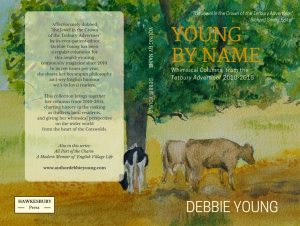 Available in paperback and ebook
Available in paperback and ebookIf you’d like to read more of my Tetbury Advertiser columns, generously described by the editor as
the magazine’s “jewel in the crown”,
you can now catch my first six years’ worth
in paperback or as an ebook, Young By Name
(paperback ISBN 9781911223030).
Filed under: Personal life, Travel, Writing Tagged: camper van, motorhome, recharging batteries, summer holidays, Tetbury Advertiser

September 13, 2016
My Talk for Sopworth Ladies’ Circle: An Author’s Journey in the 21st Century
A summary of the talk I gave to a local women’s group about being an author
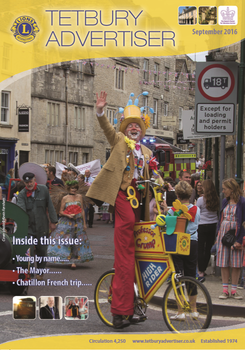 Unfortunately I couldn’t take any photos last night at the delightful village of Sopworth, so here’s the cover of the latest Tetbury Advertiser, which was the catalyst for this gig! (My Young By Name column gets a shout-out, bottom left.)
Unfortunately I couldn’t take any photos last night at the delightful village of Sopworth, so here’s the cover of the latest Tetbury Advertiser, which was the catalyst for this gig! (My Young By Name column gets a shout-out, bottom left.)Last week I did something I’d never done before: entered Sopworth Village Hall! Sopworth is an idyllic little village tucked away on the edge of rural Wiltshire. A drive through its winding lanes is an estate agent’s dream. Beautiful honey-coloured Cotswold stone cottages and substantial detached houses are surrounded by flower-filled gardens, with the only background noise the sounds of nature.
I’d been invited to speak to the Sopworth Ladies’ Circle about my life as a writer because the events organiser enjoyed the regular column I write for the local monthly magazine, the Tetbury Advertiser. (Tetbury is Sopworth’s nearest town.) This magazine, run by the Tetbury Lions, does great things to unite and inform the local community. For this it was rewarded last year with the Queen’s Award for Voluntary Service. I’m proud to support its work.
The Essence of My Talk
About fifteen ladies attended, a couple of them interested in writing themselves, and they all listened attentively to my three-part talk (15 minutes per part) in which I explained:
how I came to be an author
why I think there’s never been a better time to be an author
my ten top tips on how to become an author
I won’t say any more about the first point, because that information is elsewhere on this blog (see personal bio and career). Instead I’ll give an abridged version of what I said about the second point, and list those 10 top tips.
Why There’s Never Been a Better Time to Be An Author
The many reasons include the greater ease of writing, editing and publishing; the wider reach of books in all their forms to potential readers around the world; and the benefits authors gain from self-publishing such as greater creative control and higher potential earnings. Here are those points in a little more detail:
Modern technology makes it much easier to write and edit manuscripts, whether you use bog-standard software such as Word, or invest in specialist software such as Scrivener (a fancy word-processing system developed especially for authors, complete with virtual corkboard for plotting) or Dragon (highly accurate voice recognition software that enables you to write much faster, no matter how high your typing speed).
Technogical advances and trends also make it possible for authors to upload their books to publishing and distribution platforms such as Amazon, which means that authors can, from the comfort of their own homes, publish books that are almost immediately available to buy in print and in ebook form all over the world.
The development of sophisticated ereaders that allow for the user to choose typeface style and size makes it possible to reach those who are “print disabled” whether through conditions such as dyslexia or bad eyesight, and those who are unable to hold printed books e.g. those whose hands are weakened by rheumatoid arthritis (e.g. me).
The new era of digital audio books is increasing reach to the blind.
New synchronising technology that connects ebooks with audio books, enabling you pick up on audio in the car where you left off reading your ebook at home, for example, creates more reading opportunities for readers – and therefore more readers for authors.
The easy availability of books on smartphones is opening up new markets in developing and remote countries previously unreachable by print or where print books are beyond the financial or practical reach of most people
The rise of modern self-publishing as a viable alternative liberates the would-be author from dependence on previously essential third parties – agents and big publishing houses.
Self-publishing allows authors to retain creative control rather than having their views overruled by publishers’ marketeers.
It also allows authors to make much more money per book sold – typically 70p in the £ of the cover price for an ebook, compared to 5p for trade-published books.
Reading is still a very popular hobby, with all the debates about ebooks and ereaders having fuelled new conversations about reading, rather than killing book sales.
Bookshops are thriving, despite some closures, with new bookshops becoming more dynamic and exciting places to be – real community centres buzzing with events, activities and coffee shops, rather than just being places to buy books.
National programmes and charities continue to promote reading as a desirable activity to the general public, e.g. World Book Day, World Book Night, Readathon.
The general public are hungry to meet authors in real life, even those they’ve never heard of – hence the growing popularity of small local festivals such as the free Hawkesbury Upton Literature Festival (run by me!)
There is a hugely supportive and generous community of self-published authors which anyone may join to help them take advantage of all these opportunities – the Alliance of Independent Authors (ALLi), of which I’m proud to be a part. (I’m Commissioning Editor of ALLi’s Author Advice Centre blog.)
 Great source of author networking opportunities – click the image for more info
Great source of author networking opportunities – click the image for more infoJust Two Disadvantages
Of course, it’s not all good news. There are two key disadvantages:
as a self-published author, you assume all the responsibilities of a publishing house, including production and marketing (but don’t worry, it’s best practice to delegate to freelance experts or specialist services for aspects that you don’t have the skills to do yourself e.g. cover design – and no-one should ever attempt to do their own proofreading!)
with it now being so much easier to publish your own books – and it’s that fact of publishing your books that turns you from being a mere writer into an actual author – more people are doing it, which means you have much more competition in the market
10 Top Tips on Becoming an Author
If those two factors don’t deter you from entering the fray, here are my ten top tips to help you achieve your writing ambitions.
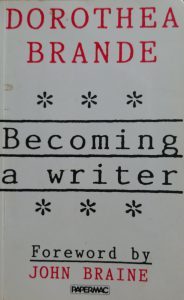 Establish regular writing habits, ringfencing realistic timeslots to suit your life e.g. get up earlier, go to bed later, scribble in your lunch hour.
Establish regular writing habits, ringfencing realistic timeslots to suit your life e.g. get up earlier, go to bed later, scribble in your lunch hour.Aim to write a set number of words every day – it doesn’t have to be huge, but a single daily page will add up to a substantial novel over a year.
Don’t wait for the muse to strike – just allow your brain free rein, writing whatever comes into your head or to specific prompts (e.g. imagine a back story to a newspaper article, or turn the radio on at random and write about the first thing you hear). You’ll soon realise you have got plenty of ideas and inspiration after all.
Join encouraging groups such as ALLi to reassure yourself you’re not alone and to gain moral and practical support (conversely, leave any writers’ groups that bring you down).
Take advantage of technology to increase your productivity – Scrivener (writing software) and Dragon (speech recognition) are excellent investments of your money and the time it takes to learn to use them well.
Expect to edit – a lot. No-one writes perfect copy first time. Rough gemstones need lots of polishing to make them shine.
Delegate what you can’t do yourself, including different aspects of editing.
Read good advice books about writing – whichever ones resonate with you. My favourite is Dorothea Brande’s Becoming a Writer.
Read widely in general – your writing will improve by osmotic or subliminal learning.
Make a public commitment to your writing goals and they’ll seem much more real and worth striving for.

 Thanks again to Sopworth Ladies’ Circle for making me so welcome. I’m hoping they will take up the invitation I gave them to attend the next free Hawkesbury Upton Literature Festival next April!
Thanks again to Sopworth Ladies’ Circle for making me so welcome. I’m hoping they will take up the invitation I gave them to attend the next free Hawkesbury Upton Literature Festival next April!
I always enjoy the opportunity to talk to groups like this – invitations are always welcome via my contact page.
A full programme of my events may be found on my Events page.
Filed under: Events, Reading, Self-publishing, Writing Tagged: how to become a writer, how to become an author, Self-publishing, top tips, Writing

September 5, 2016
September – Not an End, but a Beginning
In my column for the September issue of the Hawkesbury Parish News, I’ve been sharing my take on the end of the summer holidays and the start of the new school year.
 Our entry for the carnival a few years ago (although every Hawkesbury Show Day it’s pandemonium in our house)
Our entry for the carnival a few years ago (although every Hawkesbury Show Day it’s pandemonium in our house)They Think It’s All Over
How old do you have to be before you stop thinking in academic years? Even when my daughter has finished her education, I’m sure I’ll still be treating September as the chance for new beginnings – a time to start learning new skills and mastering different subjects.
Not that I intend ever to take another academic exam. My ambition applies to a completely different kind of accomplishment: entering exhibits for the Hawkesbury Horticultural Show. The start of September means I have a whole year ahead to create a worthy winner in any category, whether handicraft, domestic, or horticultural.
 Two bags made from recycled plastic carrier bags – one of which earned my aunt the trophy for best usable object made from recycled materials
Two bags made from recycled plastic carrier bags – one of which earned my aunt the trophy for best usable object made from recycled materialsI’ve been fortunate enough to win prizes in many different classes over the years, some due more to luck (e.g. the odd shaped vegetable) than skill (third prize for crochet – go, me!) But every Show Day, as I admire the astonishing array of exhibits in the marquee, I’m always inspired to take up a new hobby so that the following year I might compete in a different class.
So if you’ve been mourning the fact that Hawkesbury Show is over till next August, think again. There’s never been a better time than September to start preparing your entries for next year’s Show, while your inspiration is fresh and time is on your side.
Happy New Show Year, folks!
 And just to prove time really is on your side – my dad won this cup last year at the age of 83 and my aunt this year at the age of 80
And just to prove time really is on your side – my dad won this cup last year at the age of 83 and my aunt this year at the age of 80
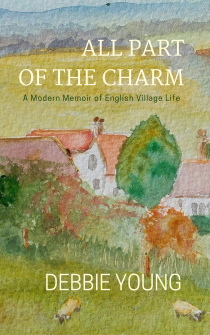 If you’d like to read more short thoughts like this one, you might enjoy All Part of the Charm, which brings together in book form six years’ worth of my columns for the Hawkesbury Parish News, plus a set of essays on my first impressions of village life when I first moved here over 25 years ago.
If you’d like to read more short thoughts like this one, you might enjoy All Part of the Charm, which brings together in book form six years’ worth of my columns for the Hawkesbury Parish News, plus a set of essays on my first impressions of village life when I first moved here over 25 years ago.
Available to order from all good bookshops (just quote ISBN 978-1911223023) or from the usual online retailers.
Coming soon: my debut novel which takes place
around a village show like Hawkesbury’s:
Best Murder in Show
Filed under: Events, Family, Personal life, Writing Tagged: ambition, crafts, Hawkesbury Parish News, Hawkesbury Show, hobbies, skills

August 26, 2016
Thank You, Matthew Paris – Now I Don’t Have To Go To Peru
A post about holiday reading, discussed after my holiday on the BBC Radio Gloucestershire Book Club this week
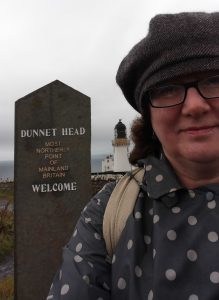 Fending off the most northerly midges of mainland Scotland this summer
Fending off the most northerly midges of mainland Scotland this summerAlthough I love travelling, and rarely turn down an opportunity to travel anywhere, I do love putting in extra miles via the pages of a good travel book, whether to places I know well, to places I plan to go, or places I know will always be off my agenda.
And once I’m on holiday, one of the chief pleasures is having more time to read. I usually pack books about the place that I’m visiting, and I enjoy buying local books as souvenirs, to extend the holiday long after its over. I have amassed quite a collection of books by Scottish writers from the many times I’ve visited my husband’s native country, from fiction and poems to history books and memoirs.
Not So Plain Sailing in Scotland
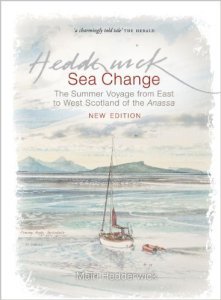 A personal account of sailing through and beyond the Caledonian Canal
A personal account of sailing through and beyond the Caledonian CanalThis year one of my favourite holiday reads was Sea Change, Mairi Hedderwick’s illustrated travelogue of her sailing trip from the east coast to the west via the Caledonian Canal. You may know her better as the author and illustrator of the delightful Katie Morag series of children’s story books set on a little Scottish island. She writes for adults as evocatively as she paints, and it was a pleasure to share her watery journey as by chance we shadowed part of her journey from Mallaig (in the west) to Inverness in our camper van. (You can read my review on my book blog here.)
Grittier in Glasgow
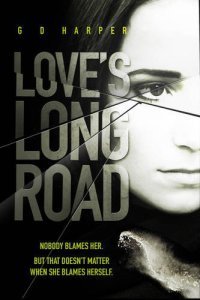 Grittier but equally evocative was G D Harper’s psychological thriller Love’s Long Road, set partly in Glasgow and Fort William – we also passed through the latter on our summer journey in a trip of over 1,000 miles. (My review’s on my book blog here if you’d like to know more about it.)
Grittier but equally evocative was G D Harper’s psychological thriller Love’s Long Road, set partly in Glasgow and Fort William – we also passed through the latter on our summer journey in a trip of over 1,000 miles. (My review’s on my book blog here if you’d like to know more about it.)
Peruvian Pleasure
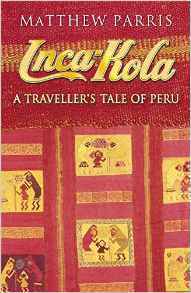 A bumpier journey than Mairi Hedderwick’s crossing Peru
A bumpier journey than Mairi Hedderwick’s crossing PeruBut the book I enjoyed the most on holiday was set in a completely different land – Peru, a favourite haunt of political columnist and broadcaster Matthew Parris, in Inca-Kola. (Yes, it is a real drink.) I can’t imagine that I will ever go to Peru myself, though I’ve always been intrigued by the place since my earliest introduction to it through fiction. Parris didn’t encounter any marmalade-eating bears on his trek, although some violet blancmange makes an ominous appearance, but he is about as charming as Paddington Bear, and it was a pleasure to spend time in his company through the pages of his book which I’ve reviewed on my book blog here.
Sharing the Love of Travel Books on BBC Radio Gloucestershire
So it was with great pleasure that on my return from holiday, I pitched up at the BBC Radio Gloucestershire studios on my return to discuss Inca-Kola as the station’s Book Club’s Book of the Month, chosen by presenter Dominic Cotter. Fellow guest Caroline Sanderson and I loved Inca-Kola as much as he did, and we enjoyed our usual wide-ranging discussion appraising the month’s choice while also going off at umpteen tangents.
If you’d like to listen to the show, you can catch if for the next month on BBC iPlayer here, from just after an hour into the show.
Next Month’s Book Club
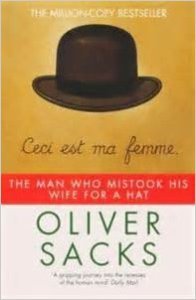 Our choice of book for next month will be investigating a different kind of journey: into the human brain, with the late, great Oliver Sacks’ classic The Man Who Mistook His Wife for a Hat, a series of beautifully written, sensitively observed case studies of neurological disorders. It’s also possibly my favourite book title of all time.
Our choice of book for next month will be investigating a different kind of journey: into the human brain, with the late, great Oliver Sacks’ classic The Man Who Mistook His Wife for a Hat, a series of beautifully written, sensitively observed case studies of neurological disorders. It’s also possibly my favourite book title of all time.
If you’ve never read it, you’re in for a real treat. Tune in to BBC Radio Gloucestershire on Monday 19th September at 1pm to join the conversation.
Filed under: Personal life, Reading, Travel Tagged: BBC Radio Gloucestershire, book reviews, Caledonian Canal, holidays, Inca-Kola, Matthew Parris, Scotland




